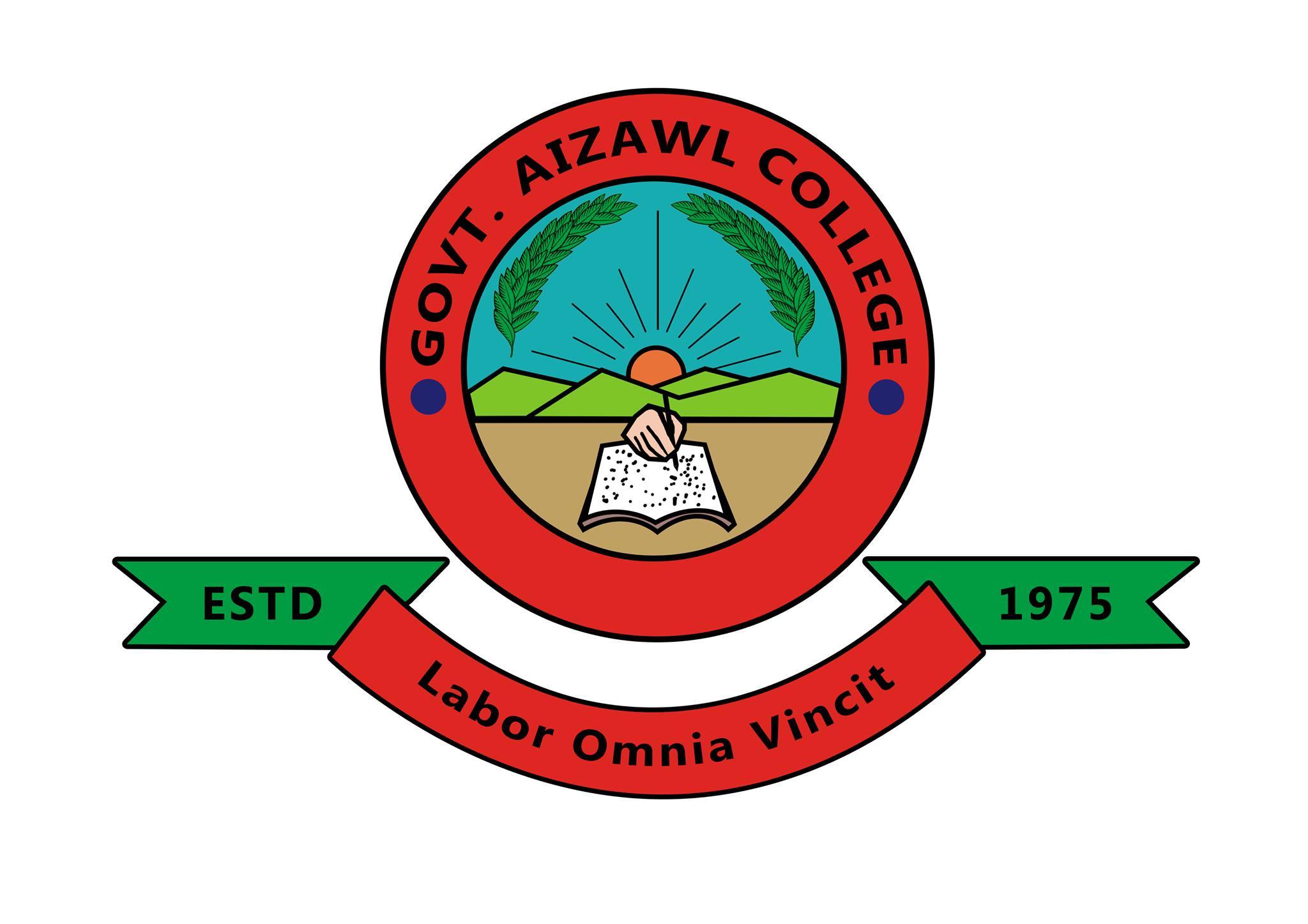I. THE COLLEGE
Govt. Aizawl College, initially a private Arts College catering to the need of the public as the second oldest college in the city, was established on January 13,1975 and Commerce and Science Streams later added in 1986 and 1988 respectively. Science Stream was detached from the college in 2001 following the policy of the Government of Mizoram to amalgamate science stream at Zirtiri Residential Science College.
The College was first affiliated to the NEHU, Shillong, Meghalaya, on July 15, 1975 and later to the Mizoram University on July 2, 2001. The College was recognised by the UGC on March 17, 1987 under Section 2f and 12B of UGC Act, 1956 and was taken over by the Government of Mizoram on January 1, 1989. The College, awarded B+ in 2004 and ‘B’ in 2011, is now awarded ‘B’ in 2016 by National Assessment and Accreditation Council.
The College caters to eight different subjects in Arts and fifteen different subjects in Commerce. The academic programmes include IGNOU centre, Certificate Course in Insurance, Remedial Coaching Classes, and National Institute of Electornics and Information Technology (NIELIT) Study Centre, and a Health Centre. The College, which is centrally located and easily accessible to public in the picturesque city of Aizawl, provides a congenial atmosphere for serious studies.
II. MISSION, GOALS AND OBJECTIVES
Mission:
To impart higher education by providing suitable ground to achieve all-round development of the ability, talent and personality of the students and ensuring that they become good citizens.
Goals:
To provide vocational and professional education for specific jobs or professions including self-employment.
Objectives:
To help form good habits, to acquire knowledge and skill, and to develop healthy interests and attitudes.
To make sincere efforts to educate students with suitable education so as to carry out various activities required in dynamic modern society.
To provide incentives to creative minds.
To prepare students for competitions at national and international levels.
To emphasize the importance of athletics in physical and mental health, and to encourage students to participate in sports activities.
To improve language skills.
REGULATIONS GOVERNING THE CHOICE-BASED CREDIT AND GRADING SYSTEM IN UNDERGRADUATE PROGRAMMES
1. a) The under graduate courses shall consist of three academic years with two semesters in each year. The first academic year shall comprise of the first and second semesters, the second academic year - the third and fourth, and the third academic year - the fifth and sixth semesters.
b) Each semester shall carry 400 marks and the total marks for the entire course shall be 2400 for B.A and each semester shall carry 400/500 marks and the total marks for the entire course shall be 2800 for B.Com.
c) Two class tests and an assignment/seminar/project etc., carrying 10 marks each shall be conducted in each paper for continuous assessment. The better marks obtained out of two tests, added to assignment/ seminar/project etc., marks, shall be taken as marks obtained in the continuous assessment in the paper.
The remaining 5 marks shall be alotted to the attendance of the student (2016 Syllabus p. xvi & CBCS Committee Minutes – 05.07.2016)
d) A candidate has to earn a minimum of 140 credits [Foundation Courses (FC) 20, Major Core Courses (CC) 72, Elective Core Courses (EC) 48] for successful completion of undergraduate degree.
e) A candidate shall register his/her name in the University in the first semester.
f) The odd semester (I,III,V) is scheduled from July to December and even semester (II,IV,VI) from January to June. End-semester examinations shall be conducted twice each year November for odd semesters and May for even semesters.
g) The working days for each semester shall not be less than 90 days excluding holidays, sports/examination/semester break/vacation, if any.
h) A candidate is eligible to appear in the end semester examination only if he/she attends a minimum of 75% of attendance as per University Ordinance.
Attendance evaluation for each course shall be given as follows:
Attendance | Marks |
90% and above | 5 |
85-89.9% | 4 |
80-84.9% | 3 |
76-79.9% | 2 |
75-75.9% | 1 |
i) A candidate shall be permitted to proceed from the first semester up to the final semester irrespective of his/her failure in any of the semester examination subject to condition that the candidate shall appear for all the arrear papers of each course(s) along with the concerned semester examinations
.
2. ELIGILIBILITY FOR ADMISSION
Pass in the Higher Secondary Examination or its equivalent conducted by any recognized Board of the State or Central Government. For admission to Commerce stream a candidate must pass in the relevant subjects.
3. CONDUCT OF EXAMINATIONS
a) University shall conduct all End-Semester Examinations.
b) Each course shall be evaluated at the scale of 100. For all courses, irrespective of theory and practical, there shall be continous internal assessment carrying 25 marks and an end-semester examination carrying 75 marks.
c) A candidate shall be permitted multiple attempts/chances chances to clear pending paper(s) [back/repeat paper(s)] within the total course duration of five years. (2016 Syllabus p. ix(V.4)xviii(XI.6) & Notification:Resln. No.AC:30:4(20)(5) – 19.Aug.2016)
d) In any case a student shall not be allowed to repeat a course for internal assessment component.
e) Improvement Examination shall be given only once during the programme duration (3+2 years) totalling to 10 semesters/5years:
i) A candidate who passed Bachelor Degree Examinations may be permitted to re-appear in the Examination for Improvement in the Theory Paper. However, a candidate is allowed to give Improvement for a miximum of 2 Papers for Pre CBCS candidates and 1 Paper/Course in the CBCS Programme.
ii) A student is eligible for Improvement only after passing the Final/6th Semester. However, a student is not allowed to take Improvement beyond 10 (ten) Semesters counting from the enrolment.
iii) A candidate appearing for Improvement shall not be entitled to get any Prize/Rank/Medal/Scholarship award.
f) The End-Semester paper will contain Objective/Multiple choice, Short notes and Descriptive. The distribution of marks will be as follows:-
For Full marks 75
Section A 10 Questions - 10x1 marks = 10 marks
Objective/Multiple Choice (Two Questions from each unit)
Section B 5 Questions - 5x3 marks = 15 marks
Short Notes(One out of two Questions from each unit)
Section C 5 out of 10 - 5x10 marks = 50 marks
Descriptive(One out of two Questions from each unit)
TOTAL = 75 marks
4. CLASSIFICATION OF SUCCESSFUL CANDIDATES
a) A candidate must secure a minimum of 40% of marks (equivalent Grade ‘C’) in each paper. Grading shall be based on marks obtained in both internal assessment and end semester examination.
b) The marks obtained by a candidate in all six semesters shall be taken into account while declaring the results.
c) Semester Grade Point Average (SGPA) shall be awarded on the basis of marks obtained in each semester.
d) Cumulative Grade Point Average (CGPA) shall be awarded on the basis of grades obtained in all the semesters.
e) Grade Card, based on the grades earned, shall be issued to all the registered students after every semester along with SGPA of that semester and CGPA earned till that semester.
f) The Final Grade Point (FGP) shall be awarded on the bases of CGPA secured by candidate.
5. GRADING SYSTEM
Marks | Letter Grade | Grade Value |
89.5 - 100 | O (Outstanding) | 10 |
79.5 - 89.4 | A+ (Excellent) | 9 |
69.5 - 79.4 | A (Very Good) | 8 |
59.5 - 69.4 | B+ (Good) | 7 |
49.5 - 59.4 | B (Average) | 6 |
39.5 - 49.4 | C (Pass) | 5 |
0.0 - 39.4 | F (Fail) | 0 |
6. ACADEMIC CALENDAR
* Commencement of I, III, V Sem. - 2 July
* Examination of I, III, V Sem. - November
* Mid-Semester Break - June
* Commencement of II, IV, VI Sem. - January
* Examination of II, IV, VI Sem. May
* Winter Vacation - December - January
*Note: Exact dates to be notified later as per MZU directives


















